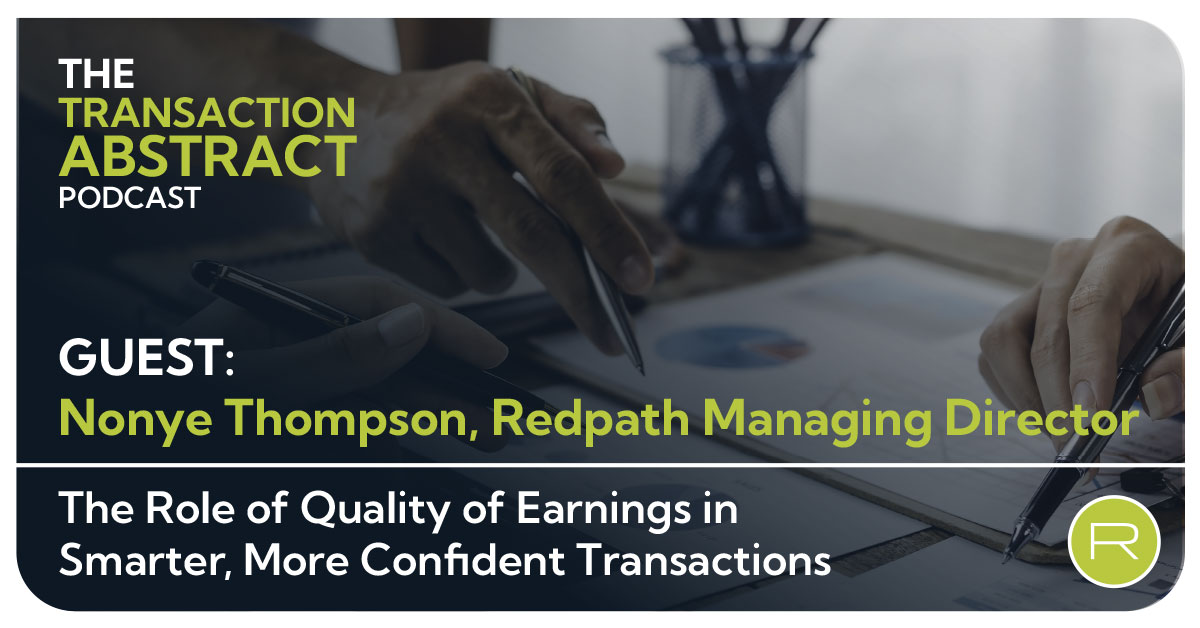The Role of Quality of Earnings in Smarter, More Confident Transactions
In this episode of The Transaction Abstract Podcast, Joe Hellman sits down with Nonye Thompson, Managing Director in Redpath’s Transaction Advisory...
4 min read
 Redpath and Company
:
Feb 17, 2022
Redpath and Company
:
Feb 17, 2022
![Deal Sourcing with Private Equity or Growth Investors [PODCAST]](https://www.redpathcpas.com/hubfs/AdobeStock_369606051_ccexpress.jpeg)
In a recent episode of The Transaction Abstract, Joe Hellman welcomed Adam Letson, Principal at TT Capital Partners. Adam specializes in deal sourcing, transaction execution, and portfolio management for TT Capital Partners, which focuses on the healthcare industry. Listen to the episode for Adam’s insights on how his team finds opportunities, how that’s changed over the years, and how strategic proprietary deals can help a business grow.
The position of growth investors in the market is distinct from that of other players, like banks. Growth investors have limited partners that commit capital to dedicated funds so the funds can be reinvested into companies. To maximize fund ROI, a first step is to find businesses whose potential and leadership vision match the firm’s expertise.
There are three main ways growth investors identify potential deals:
Proprietary deals are viewed as generally more attractive because they do not entail the same level of competition that would arise from working with an investment bank, where an opportunity may be on the radar for 200 potential buyers. These deals also entail more direct access to the leadership team.
In proprietary deals, growth investors are at an advantage when it comes to identifying a strong match. They benefit from more opportunity to tell their story and map out the potential for added value. That added value makes a substantial strategic difference, especially in healthcare—which Adam refers to as “an incredibly hot market” with more than $47 billion investments closed in the first half of 2021.
Healthcare is a complex industry with room for investment and plenty of opportunities to explore. Just having money to invest is not differentiating. Instead, firms must focus on their value add and deliver a clear, compelling narrative about that value to the final decision makers.
Relationship cultivation tends to suffer in bank- or broker-driven deal sourcing; by contrast, both sides of a transaction benefit from a deeper understanding of the other early on in proprietary deals. Growth investors can prioritize being helpful and advising a company with new ways to think through strategy, particularly when they have grown into the growth investor’s “sweet spot.”
For example, said Adam, rather than emphasizing the immediate outcome of a closed deal, TT Capital Partners works to add value up front. This lays the foundation for a stronger long-term relationship, which may be many years once a company enters into an investor’s portfolio. The true differentiator is the ability to have an impact on the business, often by suggesting ideas that help resolve immediate challenges.
In this way, growth investors “give an indication of what life would be like once we are partners.”
In a competitive market, this bolsters the prospects of growth investors, getting them on a company’s short list even if it is not time to make a decision right away. Growth investors, in turn, manage their brand by showing that they are “going to do what we say and say what we do.”
Healthcare and IT are strong growth areas attracting plenty of investor attention—combined, they have a very competitive dynamic. TT Capital Partners focuses on healthcare IT and services exclusively, and Adam makes these recommendations for considering transactions in the sector:
Looking at transactions as a whole, Adam estimates hours are divided evenly between pre- and post-issuance of a terms sheet. That includes identifying 3-4 essential conditions that must be true for the business to yield top decile returns. These typically revolve around operations and the market team.
On the market side, it is important to pinpoint opportunities early and identify key players within their network to quickly understand new and emerging pain points in the industry. From there, the focus shifts quickly to the specific company, its positioning, and evaluating its management team.
The tools to succeed from $0 to $15 million in revenue can be very different from those needed for $15 to $30 million in revenue. One of the biggest decisions a growth investor must make is whether or not the company’s leadership can adapt to that level of scale, given the right tools. It is critical to identify what other talent may need to be in place to foster continued success.
When they receive an offer, entrepreneurs are faced with the prospect of “taking some chips off the table” in hopes of a much larger return down the line. How can they evaluate that decision? It comes down to “value add,” says Adam—and then clarifies the definition:
“In the context of growing businesses, it means how does a firm like TT Capital Partners help support customer introductions or breaking down barriers if you are selling into large organizations? In our world, it is usually health plans, health systems, employer groups, those in some ways are matrixed, complex organizations. And so how do you help me navigate the four walls of a national health plan? In a lot of cases that has to do with relationships that we can bring to bear inside of those organizations.”
Once the value add is clear, the next piece is marketing, positioning, and value proposition. Whatever the size of your business, a prospective partner should offer a broader view of how to tell your brand story—being a “thought partner” engaged in constructive dialogue.
The last piece is building operational competencies to scale. Over $47 billion was invested in healthcare in early 2021, and a lot of those proceeds went to scaling operations, including hiring talent, which can be scarce in today’s historically tight labor market. Thus, the right partner must help you source and secure quality talent you need to scale. In this sense, investors must be prepared to act as “talent managers.” Their willingness and ability to do this helps you understand whether they are true problem solvers, likely to continue adding value during those inevitable “bumps in the night.” A sound professional relationship centered on honest, forthright communication is essential—and that requires high reliability on both sides.

In this episode of The Transaction Abstract Podcast, Joe Hellman sits down with Nonye Thompson, Managing Director in Redpath’s Transaction Advisory...

In this episode of The Transaction Abstract Podcast, Joe Hellman sits down with Dan Hennessey, the newly appointed CEO of Sam Schwartz Pedestrian...
![Common Legal Pitfalls in M&A Transactions with Kim Lowe [PODCAST]](https://www.redpathcpas.com/hubfs/Podcast-Legal-Pitfalls-Kim-Lowe.jpg)
In this episode of The Transaction Abstract Podcast, Joe Hellman sits down with Kim Lowe, Partner at Avisen Legal, to discuss the most common legal...